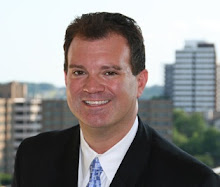The problem with our economic system is that it is based in the assumptions and theories of a different age. New technology, shifting values and patterns of behavior have conspired to create the situation in which we find ourselves.
The Web represents a medium that reduces transaction costs - or "friction" - in the economy to zero. Conversely, the value gained from the knowledge available on the web is rising asymptotically to infinity. Therefore, the concept of an "information singularity," defined as a point at which all encoded value may be shared ubiquitously is nearly upon us. Perhaps I'm stating the obvious, but if so then clearly we have not worked proactively to avoid the obvious consequences.
If we accept the premise that one function of currency is to serve as a medium of exchange, the singularity removes the need for the medium. It's like discovering that air travel eliminates the need for land as a medium of transportation. The term "the Web" can be considered as a pseudo-metaphor, or perhaps one that indicates opposite meaning... it isn't about spinning out new connections, but rather eliminating the friction associated with bringing things together. Thus, a "black hole" or information singularity analogy is more apt in describing what is happening to the economy.
The sucking sound you are hearing from job loss is the Singularity.
You probably do some of the sucking yourself. You download images for free when in the past you would have had to pay a photographer. You watch video clips for free. You read articles for free. You use Wikipedia when before you might have hired an expert. But why? Other experts are posting and making sure what is available is as valid as it can be. All this free media is wonderful for the consumer but devastating for the producers. The customer is king? Sure, but what happens to societies that consume to the point of devastation? Angkor Wat and Easter Island come to mind.
The Knowledge Age is upon us and we live in an interesting time to be alive and have access to it. However, the producers of knowledge, narrative, media - whatever you want to call it - the sensemaking stuff - will shortly be unable to continue to produce under current economic models. That is, at least those who are not already independently wealthy. But by pulling the ladder up after themselves, has the previous generation truly done us a favor?
We are at a crossroads. The choice is to either continue to uphold concepts and values that return us to a pre-singularity world, or to embrace the change and figure out a way forward.
Throughout history, people have fought the future and lost. The question is how the pain manifests and instantiates at various systemic levels. Will there be more war? Will there be more crime? More domestic violence, familial and community upheaval? Possibly. Probably unless we get our collective act together and realize that yes, it is the end of the world. But just as the phoenix rises from the ashes, the future will be one that is brighter. One that does not rely on a currency to motivate people, because people can trade value without the need for middlemedia.
Perhaps it is also time to return the favor to those who refuse change. Certainly there are sectors of the economy where currency plays a different role. Perhaps those roles should be granted greater distinction and recreated digitally. Whatever the new system looks like, we must be careful not to label it with epitaphs of the past.
There are many questions and challenges ahead, but we have remained tethered to the ground by the root of evil for too long. It is time to release our grip on cash and open our hands and hearts to others. There's nothing stopping us but ourselves.
I call upon business leaders, economists and academics to design the new economics of value. One where a "barter economy" is as anachronistic as calling cars "horseless carriages." The Singular Economy is one that focuses the light of value globally, and, perhaps one day, at the stars.
###
P.S. Am remembering a clip from a movie... found
this. And
this.
What do you think? I realize that this may be too Star Trek for many people to handle, but for those of us who wish to achieve greater visions of the future than our current world, don't we owe it to ourselves to explore and experiment with different ideas? Let's not repeat the mistakes of the past, but help economics to evolve and spring forth new life. If you agree or disagree, why or why not?
